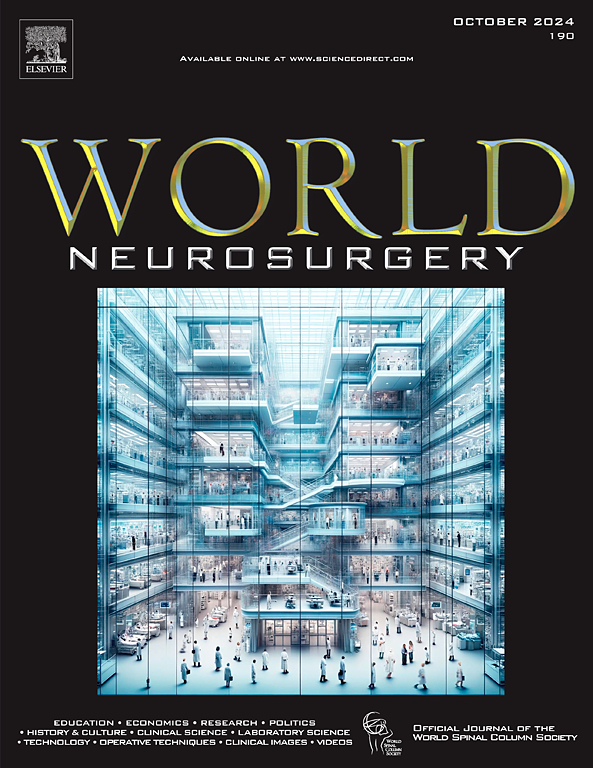先心病患者的严重脑外伤疗效。
IF 1.9
4区 医学
Q3 CLINICAL NEUROLOGY
引用次数: 0
摘要
目的:患有精神疾病(PI)的人发生创伤性脑损伤(TBI)的几率更高。然而,人们对潜在精神疾病对创伤性脑损伤结果的影响知之甚少:我们分析了本院在 2010-2021 年间收治的 633 名成年重度 TBI(sTBI)患者的病历。我们确定了有病前 PI 的患者(Psych(+)组,n=129)和仅有药物使用障碍的患者(SUD(+)组,n=60),并将他们与无 PI 的患者(Psych(-)组,n=480)进行了比较。结果测量包括出院时的格拉斯哥昏迷量表(GCS)、住院时间(LOS)、院内存活率和格拉斯哥结果量表扩展版(GOS-E):结果:Psych(+)组的院内存活率更高(69.8% 对 55.0%,P=0.003),出院 GCS 重度(3-8)患者更少(28.7% 对 46.0%,P=0.003):有 PI 和 SUD 的患者在 sTBI 后似乎有更好的预后,但住院时间更长。未来的研究应调查这些结果的内在机制。本文章由计算机程序翻译,如有差异,请以英文原文为准。
Severe Traumatic Brain Injury Outcomes in Patients with Premorbid Psychiatric Illness
Objective
Individuals with psychiatric illnesses (PIs) have increased rates of traumatic brain injury (TBI). Nonetheless, the influence of underlying PI on TBI outcomes is poorly understood.
Methods
We analyzed the medical records of 633 adult-severe TBI patients admitted to our institution between 2010 and 2021. We identified patients with premorbid PI (Psych (+) group, n = 129) and a subset with only a substance use disorder (SUD (+) group, n = 60) and compared them to patients without PI (Psych (−) group, n = 480). Outcome measures included discharge Glasgow Coma Scale (GCS), length of stay, in-hospital survival, and Glasgow Outcome Scale-Extended (GOS-E).
Results
The Psych (+) group had increased in-hospital survival (69.8% vs. 55.0%, P = 0.003) and fewer patients with severe (3–8) discharge-GCS (28.7% vs. 46.0%, P < 0.001). The SUD (+) group had increased in-hospital survival (70.0% vs. 55.0%, P = 0.028) and fewer patients with severe discharge-GCS (28.3% vs. 46.0%, P = 0.009). However, the Psych (+) (21.0 vs. 10.0 days, P < 0.001) and SUD (+) (16.0 v. 10.0 days, P = 0.011) groups had longer length of stay. The Psych (+) group had a higher mean GOS-E at discharge (2.7 vs. 2.4, P = 0.004), 6-months (3.8 vs. 3.0, P = 0.006) and 1-year (3.4 vs. 2.3, P = 0.027). The SUD (+) group also had a higher mean GOS-E at discharge (2.8 vs. 2.4, P = 0.034), six months (3.8 vs. 3.0, P = 0.035), and one year (3.5 vs. 2.3, P = 0.008). Additionally, there were no significant differences in injury severity or computed tomography scan findings.
Conclusions
Individuals with PI and SUD appeared to have better outcomes but more complicated hospital stays following severe TBI. Future studies should investigate the mechanisms underlying these outcomes.
求助全文
通过发布文献求助,成功后即可免费获取论文全文。
去求助
来源期刊

World neurosurgery
CLINICAL NEUROLOGY-SURGERY
CiteScore
3.90
自引率
15.00%
发文量
1765
审稿时长
47 days
期刊介绍:
World Neurosurgery has an open access mirror journal World Neurosurgery: X, sharing the same aims and scope, editorial team, submission system and rigorous peer review.
The journal''s mission is to:
-To provide a first-class international forum and a 2-way conduit for dialogue that is relevant to neurosurgeons and providers who care for neurosurgery patients. The categories of the exchanged information include clinical and basic science, as well as global information that provide social, political, educational, economic, cultural or societal insights and knowledge that are of significance and relevance to worldwide neurosurgery patient care.
-To act as a primary intellectual catalyst for the stimulation of creativity, the creation of new knowledge, and the enhancement of quality neurosurgical care worldwide.
-To provide a forum for communication that enriches the lives of all neurosurgeons and their colleagues; and, in so doing, enriches the lives of their patients.
Topics to be addressed in World Neurosurgery include: EDUCATION, ECONOMICS, RESEARCH, POLITICS, HISTORY, CULTURE, CLINICAL SCIENCE, LABORATORY SCIENCE, TECHNOLOGY, OPERATIVE TECHNIQUES, CLINICAL IMAGES, VIDEOS
 求助内容:
求助内容: 应助结果提醒方式:
应助结果提醒方式:


